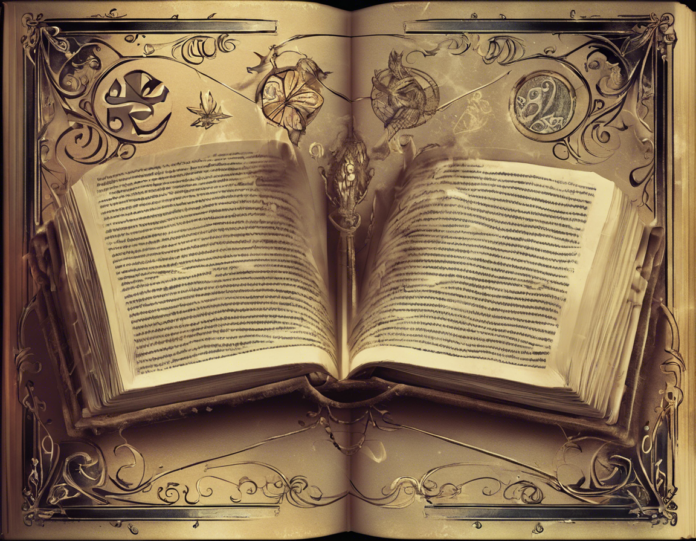Chapter 1: The Intriguing World of Magic Books
Introduction to Magic Books
Magic books have always held a certain allure and mystery, captivating readers with their potential to unlock secrets, spells, and wisdom beyond our ordinary understanding. From ancient grimoires to modern spellbooks, these enchanted tomes have been shrouded in mystique and fascination. But what exactly are magic books, and what makes them so special?
Defining Magic Books
Magic books, also known as grimoires, spellbooks, or occult texts, are manuscripts or printed works that contain instructions, rituals, spells, incantations, and mystical knowledge related to the practice of magic. These books often claim to hold the key to unlocking supernatural abilities, communicating with spirits, harnessing hidden energies, and achieving extraordinary feats.
Types of Magic Books
Magic books come in various forms and cover a wide range of magical traditions, including but not limited to:
-
Grimoires: Grimoires are books of magic that typically include instructions on how to perform magical spells and rituals. Examples include “The Lesser Key of Solomon” and “The Book of Abramelin.”
-
Spellbooks: Spellbooks focus specifically on spells, charms, and incantations for various purposes, such as love spells, protection spells, and divination. Popular examples include “The Witches’ Spell Book” and “Cunningham’s Encyclopedia of Magical Herbs.”
-
Occult Texts: Occult texts delve into esoteric knowledge, mystical teachings, and spiritual practices beyond the realm of conventional understanding. Notable examples include “The Kybalion” and “The Secret Teachings of All Ages.”
Chapter 2: The Intrigue of Magic Books in Popular Culture
Magic Books in Literature and Media
Magic books have long been a staple in literature and popular culture, serving as powerful plot devices in stories of fantasy, adventure, and the supernatural. From ancient grimoires that hold the key to saving the world to enchanted spellbooks that grant their wielders extraordinary powers, these mystical tomes have captured the imagination of audiences around the world.
Famous Magic Books in Fiction
-
The Necronomicon: A fictional grimoire created by author H.P. Lovecraft, the Necronomicon is said to contain rituals, incantations, and forbidden knowledge that can drive readers to madness.
-
The Book of the Dead: Featured in various films and TV shows, the Book of the Dead is a powerful necromantic tome that can raise the dead and unleash chaos upon the world.
-
The Book of Thoth: In Egyptian mythology and modern fiction, the Book of Thoth is a legendary text said to grant its reader unlimited knowledge and wisdom.
Magic Books in Movies and TV Shows
Magic books have also made their mark on the silver screen and small screen, with iconic examples including:
-
The Harry Potter Series: The Hogwarts library is home to numerous magical books, from “The Standard Book of Spells” to “Advanced Potion-Making,” which play a crucial role in Harry, Hermione, and Ron’s adventures.
-
The Evil Dead Franchise: The Necronomicon Ex-Mortis, or Book of the Dead, features prominently in this horror series, bringing forth demonic forces and unleashing hellish nightmares.
-
The Librarians: This TV series follows a group of librarians who protect powerful magical artifacts, including books that hold dangerous secrets and mystical powers.
Chapter 3: Unraveling the Mysteries of Magic Books
The Secrets Within
Magic books are often believed to hold ancient knowledge, esoteric teachings, and potent spells that can empower practitioners to manifest their desires, protect themselves from harm, and tap into hidden realms of existence. Some common elements found in magic books include:
-
Spellcasting: Instructions on how to cast spells for various purposes, such as love, prosperity, protection, and divination.
-
Rituals and Ceremonies: Descriptions of magical ceremonies, rituals, and invocations to invoke supernatural forces and entities.
-
Symbols and Sigils: Depictions of symbols, sigils, and mystical diagrams that hold symbolic meaning and magical power.
-
Herbal Lore: Knowledge of magical herbs, plants, and ingredients used in spellwork, potions, and rituals.
Ethical Considerations and Responsibility
Practitioners of magic are often reminded of the importance of ethical conduct, responsibility, and mindfulness when working with magic books and conducting rituals. It is crucial to respect the energy and forces invoked during magical practices, to consider the potential consequences of one’s actions, and to always strive to use magic for the greater good.
Chapter 4: Unlocking the Power of Magic Books
Tips for Exploring Magic Books
For those interested in delving into the world of magic books and occult knowledge, here are some tips to enhance your journey:
-
Research and Study: Take the time to research different types of magic books, authors, and traditions to find those that resonate with you.
-
Practice Mindfulness: Approach magic books with a clear and focused mind, maintaining a sense of mindfulness and intention in your magical work.
-
Start Small: Begin with simple spells, rituals, or meditations from magic books before progressing to more complex practices.
-
Keep a Journal: Record your experiences, insights, and results from working with magic books to track your progress and growth as a practitioner.
Chapter 5: Frequently Asked Questions (FAQs)
Q1: Are magic books real, and do they actually work?
A1: While magic books themselves may be real as physical objects, their efficacy and the results of magical practices can vary depending on the belief, intent, and skill of the practitioner.
Q2: Can anyone use magic books, or do you need special abilities?
A2: Magic books can be used by anyone interested in exploring magic and the occult, regardless of any perceived special abilities. Dedication, study, and practice are key to unlocking the potential of magic books.
Q3: Are there dangers associated with using magic books?
A3: As with any spiritual or magical practice, there can be risks involved in working with magic books, such as invoking unwanted energies or experiencing unintended consequences. It is essential to approach magic with caution, respect, and a mindful awareness of one’s actions.
Q4: How can I find authentic and reliable magic books to study?
A4: Seek recommendations from trusted sources, such as experienced practitioners, occult scholars, or reputable publishers specializing in esoteric literature. Research the background and reputation of authors and texts before diving into their magical teachings.
Q5: Can magic books help with personal growth and self-discovery?
A5: Yes, magic books can serve as tools for personal development, self-reflection, and spiritual exploration. Through studying esoteric teachings, practicing rituals, and engaging with mystical concepts, individuals can deepen their understanding of themselves and the world around them.
Q6: Are there specific guidelines or ethical considerations when working with magic books?
A6: Practitioners of magic are encouraged to approach their studies and practices with a sense of ethics, responsibility, and integrity. Respect for others, mindfulness of one’s intentions, and a focus on using magic for positive purposes are important considerations when working with magic books.
Q7: What are some common misconceptions about magic books and their use?
A7: One common misconception is that magic books hold unlimited power or can instantly grant wishes without effort or consequences. In reality, working with magic books requires dedication, study, practice, and a deep respect for the forces and energies involved in magical practices.
Q8: Can magic books help with manifesting desires or achieving goals?
A8: Magic books often contain spells, rituals, and techniques for manifesting desires, setting intentions, and aligning oneself with the energies of the universe to achieve personal goals. By working with the principles of magic, individuals can focus their intentions and actions toward realizing their aspirations.
Q9: How can I discern between genuine magical teachings and mere fantasy in magic books?
A9: It is essential to approach magic books with a critical mind, discerning between symbolic, metaphorical, or allegorical teachings and claims of literal, miraculous results. Seeking guidance from experienced practitioners, scholars, and mentors can also help navigate the complexities of magical literature.
Q10: What role do magic books play in the modern practice of witchcraft, paganism, and occultism?
A10: Magic books serve as valuable resources, guides, and sources of inspiration for modern practitioners of witchcraft, paganism, and occultism. From traditional grimoires to contemporary spellbooks, these texts provide a rich tapestry of magical knowledge, rituals, and traditions that continue to shape the practices of modern magic users.
In conclusion, magic books hold a special place in the realm of the occult, offering seekers a gateway to mystical knowledge, spiritual growth, and magical empowerment. By exploring the enchanting world of magic books with curiosity, reverence, and a discerning eye, practitioners can unlock the profound wisdom and transformative power hidden within these timeless tomes.

